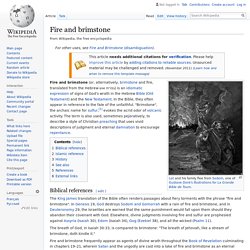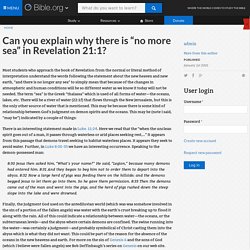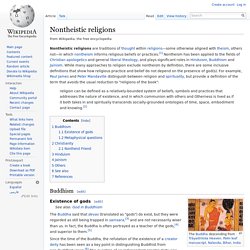

Annihilationism and universalism. Christian news. Science and Nonduality. Authors. Fire and brimstone - Wikipedia. Fire and brimstone (or, alternatively, brimstone and fire, translated from the Hebrew גפרית ואש) is an idiomatic expression of signs of God's wrath in the Hebrew Bible (Old Testament) and the New Testament.

In the Bible, they often appear in reference to the fate of the unfaithful. "Brimstone", the archaic name for sulfur,[1] evokes the acrid odor of volcanic activity. The term is also used, sometimes pejoratively, to describe a style of Christian preaching that uses vivid descriptions of judgment and eternal damnation to encourage repentance. Biblical references[edit] Can you explain why there is “no more sea” in Revelation 21:1? Most students who approach the book of Revelation from the normal or literal method of interpretation understand the words following the statement about the new heaven and new earth, “and there is no longer any sea” to simply mean that because of the changes in atmospheric and human conditions will be so different water as we know it today will not be needed.

The term “sea” is the Greek “thalassa” which is used of all forms of water—the oceans, lakes, etc. There will be a river of water (22:1f) that flows through the New Jerusalem, but this is the only other source of water that is mentioned. This may be because there is some kind of relationship between God’s judgment on demon spirits and the oceans. This may be (note I said, “may be”) indicated by a couple of things: 8:30 Jesus then asked him, “What’s your name?” Nontheistic religions. Religion can be defined as a relatively-bounded system of beliefs, symbols and practices that addresses the nature of existence, and in which communion with others and Otherness is lived as if it both takes in and spiritually transcends socially-grounded ontologies of time, space, embodiment and knowing.[2] Buddhism[edit] Existence of gods[edit] [edit] On one occasion, when presented with a problem of metaphysics by the monk Malunkyaputta, Buddha responded with the Parable of the Poison Arrow.

When a man is shot with an arrow thickly smeared with poison, his family summons the doctor to have the poison removed, and the doctor gives an antidote:[7] But the man refuses to let the doctor do anything before certain questions can be answered. Christianity[edit] A few liberal Christian theologians, define a "nontheistic God" as "the ground of all being" rather than as a personal divine being.
Secular humanist Sidney Hook wrote in an essay called "The Atheism of Paul Tillich": Spiritual music.
Stillpoint Family Resources. What religion did Mahatma Gandhi practice. Christian star. Epicenteroftheuniverse. Joseph Smith: The Prophet of the Restoration. Broadcast Yourself. Goodnewspirit. History channel on same. Eternal Productions - Links. Eternal Productions. Paul McGuire best-selling author of 23 books including "A Prophecy of the Fut... St. John the Apostle Catholic ChurchOregon City, Oregon - Home. Easter 2003.
The 10 Non Virtuous Actions. 82 Shares Twitter 4 Facebook 13 Google+ 40 Pin It Share 3 LinkedIn 0 inShare0 StumbleUpon 22 Email -- Email to a friend 82 Shares × There is a certain universal moral compass that guides us all and regardless of your religious beliefs these moral guidelines are very similar across humanity.

The problem is that we do not always follow our compass. Atrocities big and small are committed every day across the world. Engaging in negative actions will never produce positive results; if you harm someone you can not expect that good karma will float your way. It’s a lot like planting a tomato seed; you shouldn’t expect to get an orange tree. We all know that good intentions and virtuous actions will plant seeds for future happiness.
These seeds sometimes aren’t apparent right away; these karmic seeds can lie dormant for a long time, until the right conditions ripen, and then they produce their effect. It’s kind of interesting to think that you are in the driver’s seat of your future. Try. 1. 2. 3. 4.